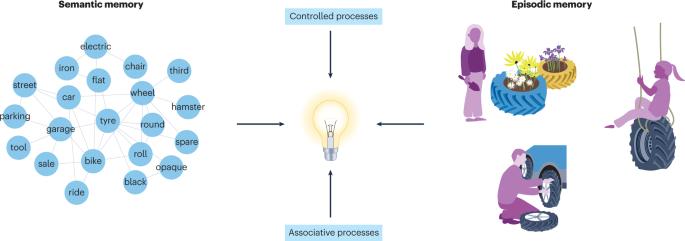The role of memory in creative ideation
IF 16.8
Q1 PSYCHOLOGY, MULTIDISCIPLINARY
引用次数: 12
Abstract
Creativity reflects the remarkable human capacity to produce novel and effective ideas. Empirical work suggests that creative ideas do not just emerge out of nowhere but typically result from goal-directed memory processes. Specifically, creative ideation is supported by controlled retrieval, involves semantic and episodic memory, builds on processes used in memory construction and differentially recruits memory at different stages in the creative process. In this Perspective, we propose a memory in creative ideation (MemiC) framework that describes how creative ideas arise across four distinguishable stages of memory search, candidate idea construction, novelty evaluation and effectiveness evaluation. We discuss evidence supporting the contribution of semantic and episodic memory to each stage of creative ideation. The MemiC framework overcomes the shortcomings of previous creativity theories by accounting for the controlled, dynamic involvement of different memory systems across separable ideation stages and offers a clear agenda for future creativity research. Neurocognitive evidence indicates that episodic memory and semantic memory have a more extensive role in creative ideation. In this Perspective, Benedek et al. integrate this memory research within existing creativity theorizing to present a framework whereby creative ideas arise across four distinguishable stages.

记忆在创造性思维中的作用
创造力反映了人类产生新颖有效想法的非凡能力。实证研究表明,创意并不是凭空出现的,而是通常由目标引导的记忆过程产生的。具体来说,创造性构思由受控检索支持,涉及语义记忆和外显记忆,建立在记忆构建过程的基础上,并在创造过程的不同阶段以不同方式调用记忆。在本视角中,我们提出了创意构思中的记忆(MemiC)框架,该框架描述了创意构思是如何在记忆搜索、候选构思构建、新颖性评估和有效性评估这四个不同阶段产生的。我们讨论了支持语义记忆和外显记忆对创意构思每个阶段的贡献的证据。MemiC框架克服了以往创造力理论的不足,解释了不同记忆系统在可分离的构思阶段的可控、动态参与,并为未来的创造力研究提供了明确的议程。神经认知证据表明,外显记忆和语义记忆在创意构思中发挥着更广泛的作用。在本《视角》中,贝内德克等人将这一记忆研究与现有的创造力理论相结合,提出了一个框架,据此,创造性构思产生于四个可区分的阶段。
本文章由计算机程序翻译,如有差异,请以英文原文为准。
求助全文
约1分钟内获得全文
求助全文

 求助内容:
求助内容: 应助结果提醒方式:
应助结果提醒方式:


